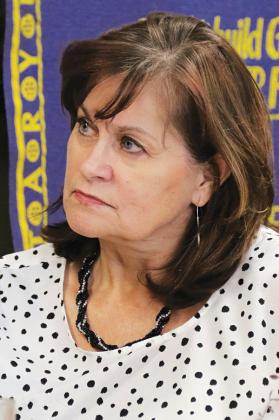
Harlan Kirgan
Madelaine Landry has a message she wants you to hear.
Seriously, she wants you to listen.
Landry, who recently retired as LSUE Foundation executive director, is owner of Listen Hear, LLC, located in the SEED Center, Lake Charles.
Landry’s point to Eunice Rotary Club members recently is communication is a constant.
“Whether we are engaging in intrapersonal communication, which is talking to ourselves and, yes, that is normal, and, yes, everybody does it, or interpersonal communication, which is talking with other people, we cannot not communicate,” Landry said.
Humans are social creatures, she said.
“We want to be with people who really listen to us, who really share with us some similarities. We long to interact with people who have the same memories as we do and share those memories,” she said
The company she started has been an idea for her since graduate school in 2005, she said.
Listening is a skill that always needs work, she said
“We spend a disproportionate amount of time in our education system and on-the-job-training teaching young adults and working adults how to speak, how to make presentations, but we spend very little time teaching them how to listen mindfully,” she said.
“What good is a presenter if no one listens to them?” she asked.
“What person sitting in this room today who is an employer wouldn’t want their employees to know how to listen to one another, listen to them and listen to their customers and clients?” she asked.
Job satisfaction is not primarily based on pay, but includes people feeling valued, which is communicated to employees.
Communications is always happening up and down the organization, among peers and outside to clients and from clients to employees.
The workplace also includes its insider knowledge where rules are not written down and become a culture, she said.
“... are employees encouraged by management to take well-calculated risk or is avoidance of risk a high priority?” she said.
Some organizations thrive with clearly defined rules while others feed on chaos, she said.
Landry said given the amount of time people spend at work, “... who doesn’t want that to be a positive memory?”
Landry presented 10 questions for leaders of organizations:
— If you could, would you empower them to develop and maintain relationships with one another that engender respect and trust?
— Would you like them to possess the ability to influence one another in positive ways?
— Would you like to feel reassured that they have a clear understanding of the issues affecting your business?
— Would you like to develop them into effective communicators who can work together to solve organizational problems when they arise?
— Would you like to develop them into a cohesive team that is better able to achieve your overall business or organizational goals?
— Would you like them to better understand the different contributions made by their colleagues?
— Would you like them to search together for ways to deliver imaginative and original approaches to communication issues within the organization?
— Would you like them to develop effective and consistent ways to gather ideas, feedback and insights from each other?
— Thinking about your business or organization from an outsider’s perspective, would you like to think your customers or clients feel that they receive appropriate and useful solutions?
— Would you like them to feel as if your staff or members assist them in making informed decisions?
